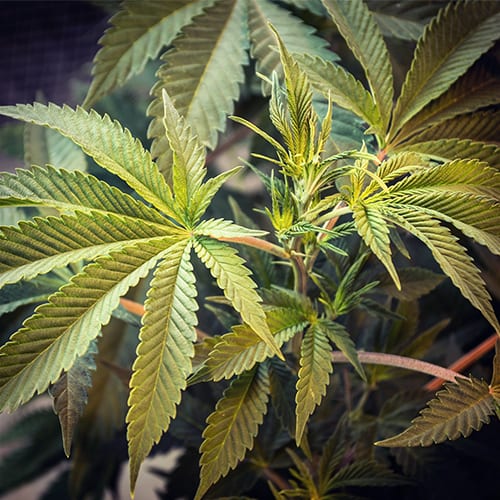
Illinois’ medical marijuana dispensaries opened their doors Monday and have begun processing patients who will receive the first batches of the drug under the state’s four-year pilot programs.
At EarthMed, a dispensary in Addison, the first patient to legally purchase pot, Chris Favela, 19, emerged with a small, opaque canister of a strain called Grape God. He paid $180 for about nine grams of the marijuana.
“I think it’s fantastic,” Favela, of Itasca, said of the program. “It’s going to help patients that are suffering. I take a lot of medication and if this reduces it … I’m a fan.”
Favela hopes the drug will relieve muscle spasms he has as a result of multiple sclerosis.
The long-delayed program has not been without early glitches, though. Some patients were turned away from EarthMed because they were not registered as customers there.
One such patient was Ryan Flannigan, 24, who has spinal arthritis and muscular dystrophy and walks with a cane.
“It’s depressing. I was hoping to get my help today. I’ve been waiting two years for this moment. It’s horrible,” said Flannigan, of Palos Heights, who said he moved to Colorado for three months so he could access marijuana there. He moved back to Illinois in anticipation of the state’s medical pot debut.
Patients who were turned away had apparently been approved to use the drug and had patient ID cards. But once patients and caregivers receive their cards, they must register online to use a particular dispensary and that can take at least 24 hours to process. Some patients and caregivers only received their ID cards in the mail Friday or Saturday.
Up to eight dispensaries were expected to open Monday, including several in the Chicago area, after state regulators gave cultivation centers the go-ahead to start shipping the drug to the retailers late last week.
Michael Murphy, of Mokena, was one of about 10 people waiting outside EarthMed for it to open Monday morning.
He said he hopes the drug will relieve headaches he suffers from past concussions playing football and injuries from a car crash, and he hopes it replaces the prescription painkillers he’s been taking.
Murphy, 54, said he’s used marijuana before but feels more comfortable now that he can purchase it legally.
The Addison dispensary and four others confirmed they have inventory and were prepared to open Monday, according to the Medical Cannabis Alliance of Illinois. The other dispensaries are in the Chicago suburb of Mundelein and in downstate Canton, Marion and Quincy. Others are planned to open Tuesday in North Aurora and Ottawa.
In Mundelein midday Monday, a crowd of more than 100 was waiting outside The Clinic Mundelein dispensary when Ben Kovler opened its doors, greeted by applause as he welcomed the first set of clients.
“This is an historic day in the state of Illinois,” said Kovler, CEO of Green Thumb Industries, the firm behind The Clinic. “What we’ve gone through (to open) is nothing compared to what the patients have gone through.”
A “Menu for Opening Day” distributed outside The Clinic featured both indica and sativa strains with prices ranging from $35 for 1.75 grams to $110 for 7 grams of either product.
The Clinic is located in a light-industrial and warehouse sector on Armour Boulevard, southwest of Route 60 at Butterfield Road.
Second in line outside The Clinic was Edwin Schlesser, who drove north from Streamwood to purchase medication that he said is preferable to the narcotics prescribed to him for a spinal condition.
“My doctor was actually proud of me for never taking the pain pills,” said Schlesser, expressing worries about addiction.
“This is God’s natural gift to us right here,” he said, holding up a sealed vial of cannabis that he intended to use as soon as he got home. “It was a long process (to acquire it), but it’s a great day.”
Illinois officials said they mailed the required ID cards Oct. 30 to qualifying patients, whose numbers have climbed to about 3,300 — still well below the number that many people in the fledgling industry say is needed to make the business viable in Illinois.
State workers were expected to work through the weekend to finish setting up a computer database of patients and caregivers that dispensaries must use to track where patients buy their cannabis and how much, so that patients cannot exceed the legal limit of 2 1/2 ounces every two weeks.
Additional dispensaries are expected to be authorized to open by the end of the year, with a total of 18 grow houses and 60 dispensaries authorized to operate under the state’s four-year pilot program, scheduled to end in 2018.
The state’s Medical Cannabis Pilot Program, which former Gov. Pat Quinn signed into law in August 2013, was designed by lawmakers to be more stringent than other states that were earlier to legalize the drug for medical purposes. Those seeking to become qualified patients, for example, must not only get proof from a doctor that they have one of about 40 qualifying conditions, but they must also submit fingerprints and get criminal background checks — measures that critics call heavy-handed and one cause of the program’s slow start.
When Quinn lost re-election to Bruce Rauner, the new administration took over the process of approving the licenses for growers and sellers. That led to further delays as Rauner’s office said it has to undertake a legal review of the process after a lawsuit was filed challenging the procedures Quinn’s administration had used.
Rauner later rejected proposals to add 11 new qualifying conditions to the list. A state panel later recommended that four pain-related conditions, autism, osteoarthritis, irritable bowel syndrome and PTSD be added to the list, but those have not yet won final approval.
Bill Wilson, 52, of Chicago, who also was waiting outside EarthMed, said he had never taken marijuana until recently. He took Celebrex and Norco for 25 years for his degenerative spinal disease, but he said they didn’t work very well and affected his stomach. He is hoping marijuana will relieve his pain and stiffness.
He said he tried some edible marijuana on trip to Colorado recently and it helped his relieve his symptoms. Since he hates smoking, he plans to vaporize the flower.
The former Board of Trade worker said his father had same condition as he and he often saw him crawl on the floor in pain. He also said his sister died of multiple sclerosis and said marijuana was only thing that relieved her muscle spasticity.
Wilson said he plans to take the strain sativa in the morning to relieve his pain and another, indica, at night to help him sleep.
Source: Chicago Tribune





